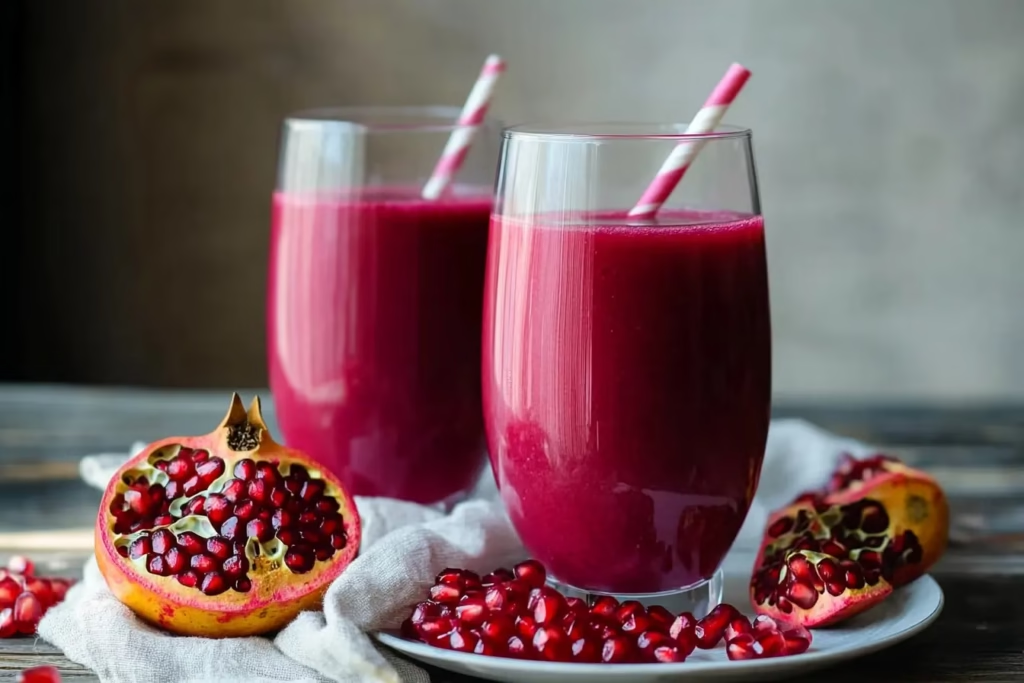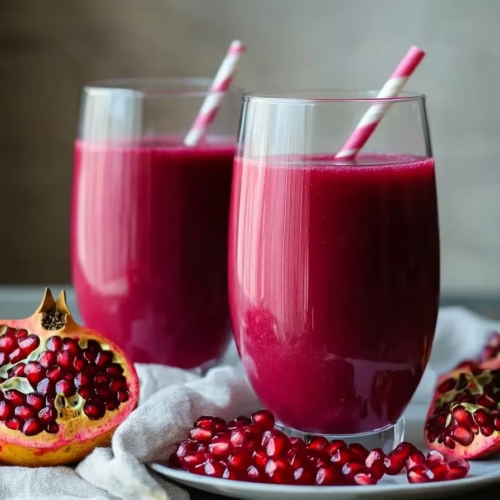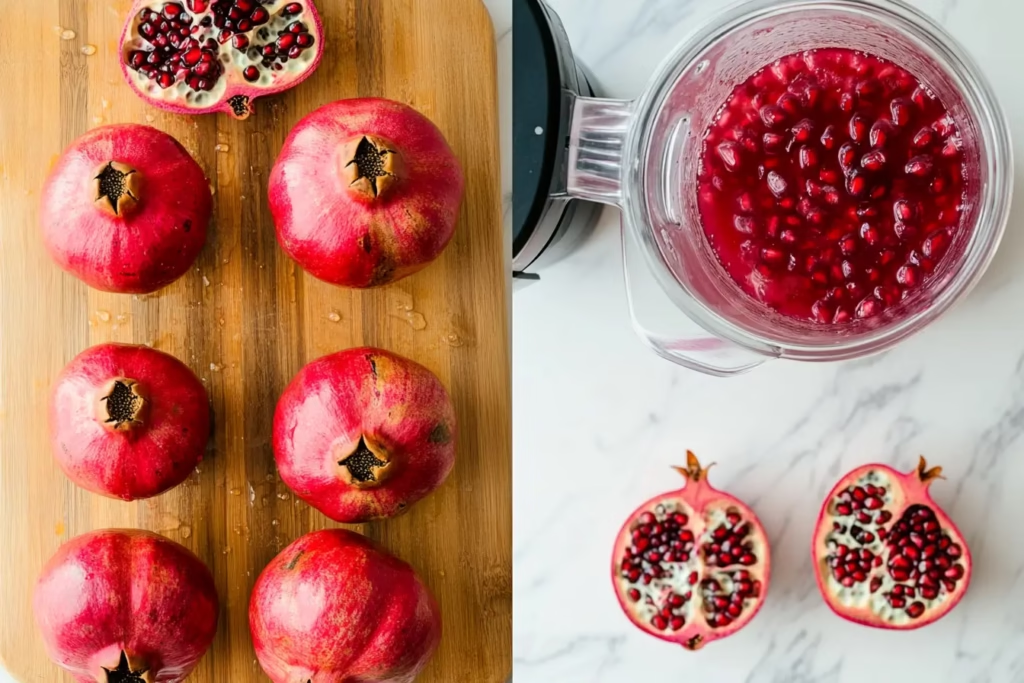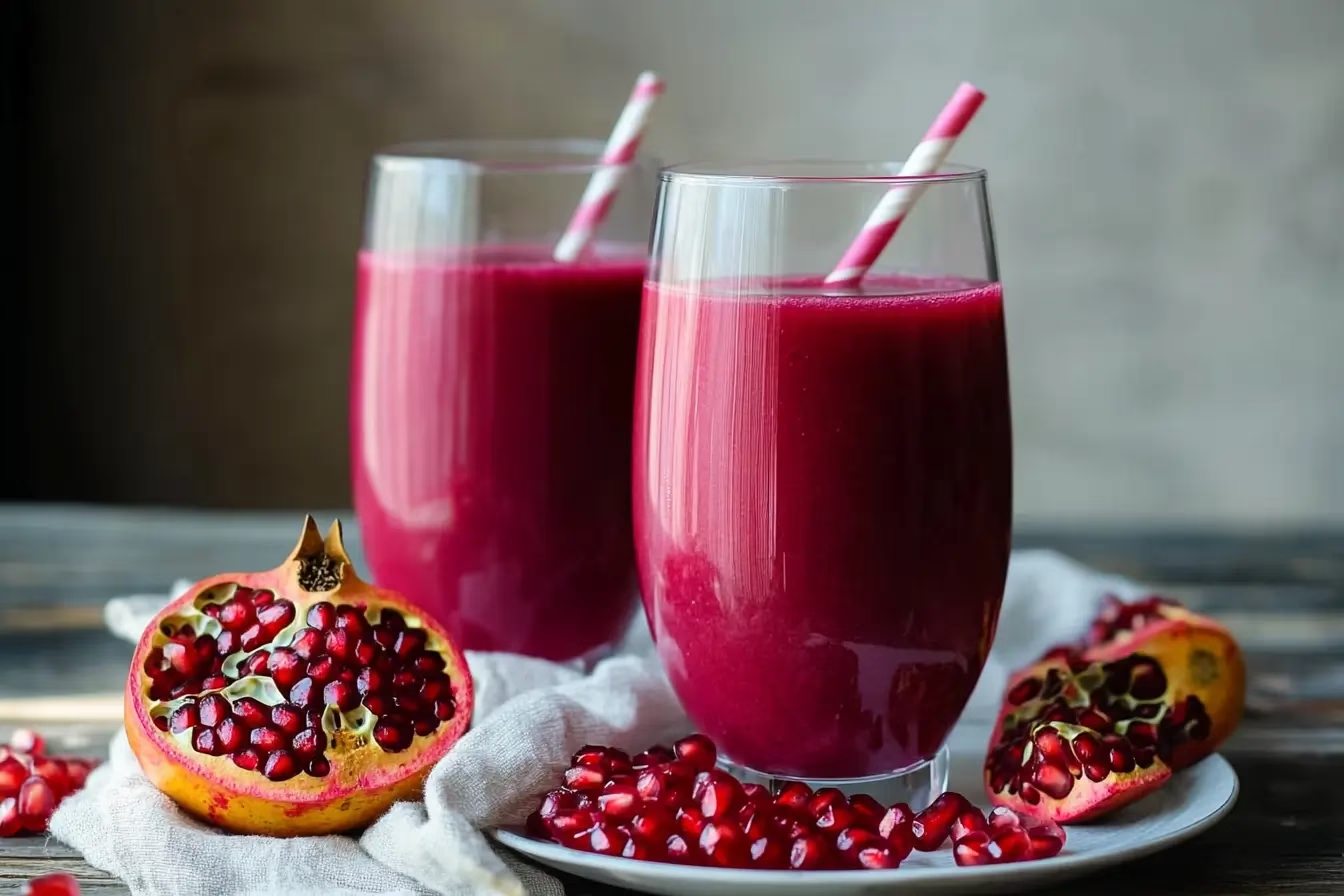There’s something deeply satisfying about cracking open a pomegranate, revealing those jewel-like seeds, and transforming them into a glass of vibrant ruby-red juice. For me, making homemade pomegranate juice is a little ritual—it’s part kitchen therapy, part nutrition boost. The sweet-tart flavor dances on your tongue, and the color alone feels like bottled sunshine (or maybe bottled sunset). This isn’t just a drink; it’s a whole mood in a glass.
Store-bought juice might be convenient, but fresh pomegranate juice hits differently. You control the sweetness, there are no preservatives, and you get the freshest flavor possible. Plus, the process is easier than you might think—no special juicer required, just a blender, a strainer, and a few ripe pomegranates.
Today, I’m going to walk you through everything: how to make it, how to mix it, what to avoid, and the benefits you’ll get from this antioxidant-packed elixir. And yes, I’ll share my foolproof step-by-step recipe that will have you sipping fresh juice in 15 minutes flat.


Fresh Pomegranate Juice
Ingredients
- 5 to 6 large pomegranates
Instructions
- Using a paring knife, cut off the top part of each pomegranate (the crown) by angling the knife downward and making a circle.
- Cut shallow lines along the skin into sections—usually 4 is enough.
- Fill a large bowl with cool water. Submerge each section and gently loosen the arils from the rind to prevent juice splatter.
- Once all arils are separated, drain the water and pour the arils into a blender. Blend for 15–20 seconds—enough to crush the arils but leave most seeds intact.
- Pour the blended mixture through a fine mesh strainer. Press the pulp with a rubber spatula to extract more juice.
- Pour into glasses and enjoy immediately. Store leftover juice in a sealed jar in the fridge for up to 5–6 days.
Notes
Nutrition
Why Make Homemade Pomegranate Juice?
Pomegranates aren’t just beautiful—they’re nutritional powerhouses. They’re loaded with antioxidants, vitamin C, potassium, and polyphenols that can help reduce inflammation and support heart health (check out these 12 science-backed pomegranate benefits).
Freshly made juice has a brighter, fresher taste compared to store-bought varieties, which are often pasteurized (meaning some nutrients may be lost). Plus, when you make it at home, you get to skip the added sugars and fillers.
For a special twist, I sometimes enjoy my pomegranate juice alongside a fruity mocktail like my Easter Bunny Punch Recipe—the colors together are simply gorgeous.
How to Make Juice from a Pomegranate?
Making pomegranate juice at home is surprisingly simple. Here’s my quick breakdown:
- Remove the Crown – Cut around the pomegranate’s top to remove the crown.
- Score the Skin – Make 4–6 shallow cuts along the skin.
- Separate in Water – Break apart the fruit under water to avoid splatter and release the arils.
- Blend the Arils – Blend for 15–20 seconds, just enough to break the seeds.
- Strain & Serve – Strain through a fine mesh sieve, pressing gently to extract all that gorgeous juice.
This method keeps your kitchen clean and your juice free from bitter rind flavor.
Fresh Pomegranate Juice Recipe
Prep Time: 15 minutes
Cooking Time: 0 minutes
Total Time: 15 minutes
Yield: About 4 cups
Calories: 136 per cup
Ingredients
- 5 to 6 large pomegranates
Instructions
- Remove the Top
Using a paring knife, cut off the top part of each pomegranate (the crown) by angling the knife downward and making a circle. - Score the Skin
Cut shallow lines along the skin into sections—usually 4 is enough. - Separate Under Water
Fill a large bowl with cool water. Submerge each section and gently loosen the arils from the rind to prevent juice splatter. - Drain & Blend
Once all arils are separated, drain the water and pour the arils into a blender. Blend for 15–20 seconds—enough to crush the arils but leave most seeds intact. - Strain the Juice
Pour the blended mixture through a fine mesh strainer. Press the pulp with a rubber spatula to extract more juice. - Serve & Store
Pour into glasses and enjoy immediately. Store leftover juice in a sealed jar in the fridge for up to 5–6 days.
Tip: Chill your glasses before serving for an extra-refreshing experience.

What Does Pomegranate Juice Mix Well With?
Pomegranate juice is incredibly versatile. Its sweet-tart flavor pairs beautifully with:
- Sparkling Water – For a refreshing, low-calorie spritzer.
- Citrus Juices – Like orange, lemon, or grapefruit for a vitamin-packed punch.
- Herbs – Mint and basil bring a fresh, aromatic twist.
- Green Tea – A health-boosting combo with subtle earthy notes.
- Mocktails & Cocktails – Perfect for drinks like my Pink Drink Recipe or even a pomegranate mojito.
For festive occasions, I love mixing it with the tropical flavors from my Brazilian Mounjaro Recipe for a vibrant party drink.
Is There a Downside to Drinking Pomegranate Juice?
While pomegranate juice is incredibly healthy, there are a few things to keep in mind:
- Natural Sugars – It’s naturally sweet, so if you’re monitoring sugar intake, enjoy in moderation.
- Medication Interactions – Pomegranate juice can interact with certain medications like blood thinners or blood pressure drugs. Always check with your healthcare provider.
- Calories Add Up – At about 136 calories per cup, it’s not excessive, but multiple servings can add up quickly.
For most people, a moderate glass per day is a fantastic way to boost your antioxidant intake.
What to Avoid with Pomegranate Juice?
To get the most out of your juice, avoid:
- Over-blending – This can crush the seeds too much, making the juice bitter.
- Including Rind – The white pith and skin can add a harsh taste.
- Leaving It Out – Fresh juice spoils quickly. Store it in the fridge in an airtight container.
- Mixing with Sugary Sodas – You’ll lose the health benefits by adding unnecessary sugar.
Instead, keep it pure or mix with naturally unsweetened beverages.
Serving Ideas & Variations
Fresh pomegranate juice is delicious on its own, but you can also:
- Make Pomegranate Lemonade – Mix equal parts juice and fresh lemon juice, then dilute with water.
- Create a Breakfast Booster – Add a splash to your morning smoothie for a tangy antioxidant kick.
- Dress Up Salads – Whisk with olive oil and honey for a pomegranate vinaigrette.
- Holiday Mocktails – Combine with ginger ale and fresh rosemary sprigs for a festive drink.
For presentation, serve in clear glasses to show off that jewel-red color. A sprig of mint or a few floating arils on top never hurts.

Storage & Freshness Tips
Fresh juice tastes best within the first 24 hours, but if you make extra:
Storage Tips
Keep your juice fresh and ready whenever you are.
-
Store in a glass jar with a tight lid.
-
Keep refrigerated at all times.
-
Freeze in ice cube trays for later use—perfect for chilling drinks without watering them down.
Why I Love Making This at Home
There’s a certain magic to making homemade pomegranate juice. It’s not just about the drink—it’s the process. The sound of seeds dropping into the water, the deep red blending in the pitcher, and that first sip that wakes up every taste bud. And yes, my hands sometimes get a little pink-stained, but it’s worth every bit.
It also makes me feel connected to the ingredients. Instead of buying something pre-packaged, I’m creating it from scratch. It’s the same reason I love crafting my own fun beverages like my Easter Bunny Punch Recipe—fresh, colorful, and made with care.
Share Your Creations
Have you tried making this juice? I’d love to see your creations! Tag me on
Facebook and Pinterest so I can see how you’ve made it your own. Whether you serve it straight, in a mocktail, or as part of a holiday spread, fresh pomegranate juice is always a showstopper.
Final Sip
Making homemade pomegranate juice is easier than you think, and the flavor payoff is huge. You’ll get fresher taste, more nutrients, and the satisfaction of creating something beautiful from scratch. So grab a few ripe pomegranates, roll up your sleeves, and start juicing—you’ll never look at store-bought the same way again.

